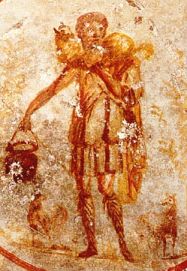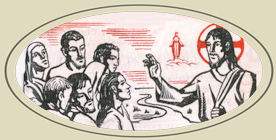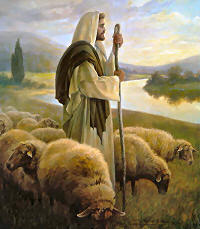» Enjoy our Liturgical Seasons series of e-books!
"I tell you most solemnly, I am the gate of the sheepfold. All others who have come are thieves and brigands; but the sheep took no notice of them. I am the gate. Anyone who enters through me will be safe: he will go freely in and out and be sure of finding pasture. The thief comes only to steal and kill and destroy. I have come so that they may have life and have it to the full."
Today is the feast of Sts. Philip & James which is superseded by the Sunday Liturgy.
Click here for commentary on the readings in the Extraordinary Form of the Roman Rite.
Sunday Readings
The first reading is taken from the Acts of the Apostles 2:14, 36-41 and if taken together with that of the following Sunday provides an alternative theme in exploring the preaching of the early Church in the persons of Paul and Barnabas. The mission first to the Jews is now to be placed second to the mission to the Gentiles, — a theme which the reading for next Sunday also explores with the warning of the preachers that those who follow the Lord will necessarily have to endure trial and sufferings. — A Celebrants Guide to the New Sacramentary - A Cycle by Kevin W. Irwin
The second reading is from the first Letter of Peter 2:20-25. In these verses today, St. Peter is giving advice to Christians who were slaves. He tells them to be submissive to their masters with all respect.
The Gospel is from St. John 10:1-10. One of the oldest paintings of Christ, in the Roman catacombs, represents Christ as carrying the injured, straying sheep gently on His shoulders back to the sheepfold. This is an image of Christ which has always appealed to Christians. We have Christ as our shepherd—He tells us so himself in today's gospel—and we do not resent being called sheep in this context. There is something guileless about a sheep, and at the same time a lot of foolishness! But with Christ as our shepherd and the "good shepherd" who is sincerely interested in the true welfare of His flock we have reason to rejoice.
The leaders of the Jews, the Pharisees and Sadducees, were false shepherds who tried to prevent the people from following Jesus, but they failed. They then killed the shepherd but in vain. He rose from the dead and His flock increased by the thousands and will keep increasing until time ends.
We surely are fortunate to belong to the sheepfold of Christ—His Church. We surely are blessed to have the Son of God as our Shepherd, who came among us in order to lead us to heaven. Do we fully appreciate our privileged position? Do we always live up to our heavenly vocation? We know His voice, we know what He asks of us, but do we always listen to that voice, do we always do what He asks of us?
 There are many among us today who foolishly think they need no shepherd. They think they know all the facts of life while they are in total ignorance of the most basic fact of all, namely, the very purpose of life. Not that the thought of it does not arise disturbingly before their minds time and time again. But they try to smother that thought and ease their consciences by immersing themselves deeper and deeper in the affairs and the passing pleasures of this temporary life. Alas for them, a day of reckoning lies ahead, a day that is much nearer than they would like to believe. What will be their fate when they meet Christ the Judge, whom they had refused to follow and acknowledge during their days on earth?
There are many among us today who foolishly think they need no shepherd. They think they know all the facts of life while they are in total ignorance of the most basic fact of all, namely, the very purpose of life. Not that the thought of it does not arise disturbingly before their minds time and time again. But they try to smother that thought and ease their consciences by immersing themselves deeper and deeper in the affairs and the passing pleasures of this temporary life. Alas for them, a day of reckoning lies ahead, a day that is much nearer than they would like to believe. What will be their fate when they meet Christ the Judge, whom they had refused to follow and acknowledge during their days on earth?
This is a misfortune that could happen to any one of us, unless we think often of our purpose and our end in life. We have a few short years, but short though they be, we can earn for ourselves an eternity of happiness during this life. Let the straying sheep boast of their false freedom and of the passing joys they may get in this life—this freedom and these joys are mixed with much sorrow, and will end very soon. We know that if we follow the shepherd of our souls, we are on the way to the true life, the perfect life, the unending life which will have no admixture of sorrow, regret or pain. Where Christ is, there perfect happiness is, and there with God's grace we hope and trust to be.
Excerpted from The Sunday Readings by Fr. Kevin O'Sullivan, O.F.M.
Commentary for the Readings in the Extraordinary Form:
Third Sunday After Easter
 "A little while and you shall see Me no longer. . .because I go to the Father. . .And you therefore have sorrow now; but I will see you again, and your heart shall rejoice, and your joy no one shall take from you" (Gospel).
"A little while and you shall see Me no longer. . .because I go to the Father. . .And you therefore have sorrow now; but I will see you again, and your heart shall rejoice, and your joy no one shall take from you" (Gospel).
Christianity is a religion of joy! (Introit). May "those. . .in error" receive this "light" (Prayer). Jesus predicts, however, that our joy can never be perfect here. The "cross before the crown" (Alleluia Verse) would indeed be a mystery had no Jesus lived it out for us.
An unbelieving "world shall rejoice" because it regards Him as dead and gone. But Christ departs only for a "little while" (Gospel) to test our love and loyalty. He shall return (as indicated by little figure of Christ in the clouds).
Prepare for His coming "in the day of visitation" by good example. "Behave yourselves honorably among pagans; that they ... observing your good works" for God and country (described in the Epistle) may recognize that Christianity is a religion of joy, now and forever!
Excerpted from My Sunday Missal, Confraternity of the Precious Blood
Meditation: The Lord is My Shepherd
We are a precious gift the Father has confided to Jesus. Thine they were: to me Thou gavest them. All that the Father gives me will come to me; and him that comes to me I will not cast out. This is the Father's will, that I should not lose one of these precious ones He has given to me. This charge which the Father has given me is more precious than anything whatsoever.
Jesus sees his own raison d'etre as that of doing the will of the Father, and the will of the Father is precisely that He should care for each one of us and give us eternal life.
All that Jesus is is precisely for me. His care of me never slackens.
"The Lord is my shepherd, I can want for nothing." If I really believed this, how different my life would be! I would never willingly jib at what happens to me since I would everything as at least permitted by Him, knowing He will make everything turn to my good I would stop trying to run my own life, preventing this or that…I would cease to care for the judgements of others, whether they like me or not, whether they think well or ill of me. I would cease wanting to feel sure about everything, above all about my spiritual life: anxious, fearful, discouraged, plagued by guilt feelings… If my faith in the unfailing tender care of my Shepherd is real, how could I allow such self-occupation?
The Shepherd psalm is one Jesus must have prayed a thousand and more times to His Father. "The Lord carried you, as a man carries his child, all along the road you travelled"…at this hour you were led to the cross. Where are the nice green pastures on that stony and painful way? Were the still waters in His burning thirst? Did He feel His head and body were being washed and anointed with oil when the crown of thorns was pressing against His temples?
"He leads me along the right path: he is true to his name…Surely goodness and kindness shall follow me all the days of my life."
Had Jesus not held firmly to this certainty, that whatever it seemed or felt like this was the truth, the real nature of things, then we would not have been redeemed. His faith would have failed. But as it proved, His faith remained steadfast and triumphed.
The Good Shepherd is risen. He who laid down His life for the sheep, who died for His flock. He is risen. Alleluia!
—Ruth Burrows, Through Him, With Him, In Him






